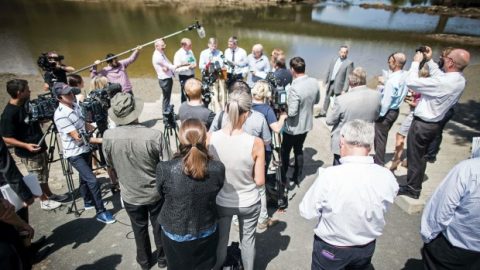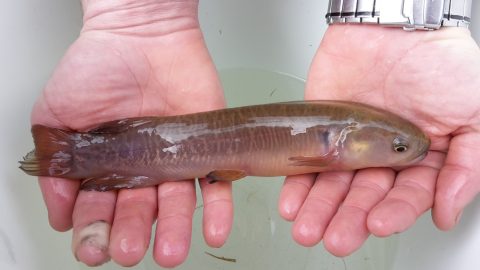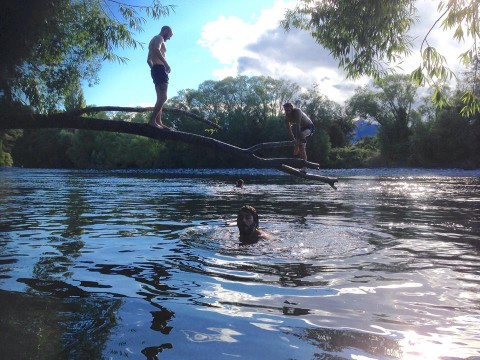New freshwater policy a win – but more work needed
It was lost in the political turmoil of the week, but on Wednesday the Government released their freshwater policy – including a new National Policy Statement on Freshwater Management.
The NPS-FM is a big deal – it tells regional councils how to set rules and limits for nutrients and pathogens in our waterways. It will dictate how clean our rivers must be, and whether they are safe for humans, and for freshwater animals and plants. Although the focus has been on what humans need to enjoy a swim in the river safely, we also need to get the balance right for our native wildlife that depends on clean water as well. For our fish, aquatic insects, and plants, it’s about more than swimming – it’s about living.
As you’ll remember, back in February Environment Minister Nick Smith released the draft of this policy. According to the draft, our rivers would be allowed to reach ecological toxicity. They could also be toxic to humans. One out of every 20 people coming into contact with the water could get sick. Family picnics and fishing trips would have a 1 in 20 chance of ending in vomiting and diarrhoea, of ending in hospital.

Government Ministers launch Clean Water Package in February (Photo: Fairfax)
Nick Smith fronted a policy that renamed ‘wadeable’ water ‘swimmable’. Nutrient levels had been set at a concentration that would kill freshwater fish. Even worse, hardly any of the rivers and streams people actually swim in would be affected by the policy at all.
Scientists were incredulous, and the public were outraged. Forest & Bird walked away from the Land and Water Forum – the stakeholder group that had been making recommendations to the Government. The media had a field day, and Nick Smith looked out of touch and foolish.
But our rivers got a second chance. The disastrous draft was consulted on, with 4000 out of 9000 submissions coming from Forest & Bird supporters. And our advocacy made a difference. The final version has just been released – so what does it offer for our lakes, rivers and aquifers?
Ecological health will be measured
This is a major step forward that Forest & Bird focused on in our submission and on the Land and Water Forum. The previous draft focussed on human health (swimmability), but what affects humans (E.coli from cow faeces) does not affect aquatic life in the same way at the same levels. Limiting nutrients, particularly nitrogen, is key for achieving ecological health.
Regional councils will now receive guidance on limiting two key parameters for measuring dissolved nutrients – DIN – dissolved inorganic nitrogen and DRP – dissolved reactive phosphorus.
However, the nitrate attribute levels are still too low. At the limit in the policy, they will maintain a level of toxicity that prevents native fish and insects from thriving.

A banded kōkopu (Photo by Stella McQueen)
Inclusion of MCI threshold
The Macroinvertebrate Community Index (MCI) for waterways will be monitored and will require action when it falls to a level of 80 or is showing a declining trend. This is a big improvement, however Forest & Bird’s submission called for an MCI of 90 because once a stream reaches 80, the ecosystem has long been in decline and may be far beyond repair. Many scientists are now recommending 90 as the absolute minimum for ecological health.
Swimmability
The risk factor for getting sick is still too high. E.coli standards still exclude the vast majority of rivers and lakes, and also it has been left to regional councils to determine which water bodies are ‘official’ swimming spots. This is subjective and could be taken advantage of.

The Choose Clean Water team takes a dip in Motueka River (Photo by Geoff Reid)
Climate change and underground aquifers are not meaningfully considered in the policy. These are both huge issues that will influence the availability and quality of water everywhere. It makes no sense to pretend that climate change isn’t happening, and won’t impact on our water ecology.
Overall, Forest & Bird sees the inclusion of ecological health markers such as MCI, DIN and DRP as a big step forward, and can be largely attributed to the work that Forest & Bird and our supporters have done alongside other key organisations. We will continue to work for genuine improvements to clean water policy both nationally and regionally.
That’s why we’ll be supporting the upcoming Vigil for Water. On August 20, communities will join together to light a candle for clean water, in solidarity with those affected by water contamination in Havelock North.
We will continue to fight for fresh water – for people, and for nature.
